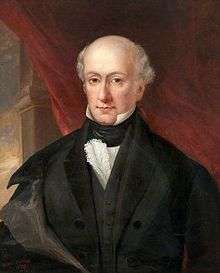George Kinloch (politician)
| George Kinloch | |
|---|---|
 Portrait by Hugh Collins | |
| Member of Parliament for Dundee | |
|
In office 1832–1833 | |
| Succeeded by | Sir Henry Parnell, B |
| Personal details | |
| Born |
30 April 1775 Dundee, Great Britain |
| Died |
28 March 1833 (aged 57) London, United Kingdom |
| Resting place | Kinloch Chapel, Meigle |
| Political party | Radical |
| Profession | Politician |
George Kinloch (30 April 1775 – 28 March 1833) was a Scottish reformer and politician.
Kinloch was born in Dundee. He spent time in France in 1793 during the French Revolution and this influenced his political views. His grandfather had obtained by marriage the estate of Clashbenie (not far from modern Errol), which his father George Oliphant Kinloch sold in order to purchase the ancient Kinloch estate from his cousin. Kinloch himself purchased what is now Carnoustie in 1808 for 11000 pounds and promoted development by starting a brickworks and providing grants for prospective residents who wished to take up feus.
His first involvement with politics was in 1814 and involved the extension of the harbor in Dundee, a project which earned him the gratitude of business interests in the city.[1] His involvement with mass meetings in 1817 and 1819 agitating for Parliamentary reform attracted less favorable attention, and he was forced to flee to France and was declared an outlaw. In 1822 his daughter was presented to George IV in Edinburgh and interceded for him, and he was able to return.
When Dundee was given representation in Parliament by the Reform Act 1832, Kinloch was elected MP. He died in London two months after the start of Parliament; his body was brought back to Scotland for burial at the Kinloch Chapel at Meigle.
A statue of Kinloch by John Steell was erected in 1872 at the Albert Institute in Dundee. A painting of Kinloch by Hugh Collins was done many years after his death.[2] A street in Dundee, Kinloch Place, is named in his honor.[3]
Family
Kinloch married Helen Smyth, daughter of John Smyth of Balhary in Perthshire. They had eight children: George (1800–1881); John (1802–1828); Cecilia (1797–1879); Margaret (died 1830); Helen (c. 1799–1823); Ann (c. 1801–1865); Eliza (c. 1804–1822); and Jemima Joanna (d. 1805).[4] A lawyer and magistrate, George Kinloch the younger received a baronetcy in 1873. A grandson, Sir John Kinloch (1849–1910), was also an MP.
Further reading
- The Radical Laird; A Biography of George Kinloch, 1775–1833, Charles Tennant, The Roundwood Press, 1970
References
- ↑ Roll of Eminent Burgesses of Dundee, 1513–1886, Alexander Hastie Millar, Dundee: 1827, p. 270
- ↑ portrait of Kinloch
- ↑ Kinloch Place
- ↑ A Genealogical and Heraldic History of the Peerage and Baronetage, the Privy Council, Knightage and Companionage, Bernard Burke and Ashworth Burke, London: Harrison and Sons, 1914, p. 27
| Parliament of the United Kingdom | ||
|---|---|---|
| New constituency | Member of Parliament for Dundee 1832 – 1833 |
Succeeded by Sir Henry Parnell, Bt |